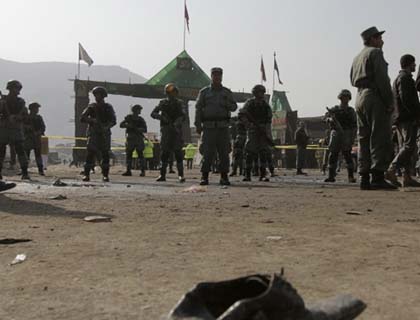Right after the series of attacks on the day of Ashura in Kabul, Mazar-e-Sharif and Kandahar which left more than seventy dead and more than two hundred injured, a Pakistan-based insurgency group known as Lashkar-e-Jangvi proudly claimed the responsibility. A person by the name of Abubakr Mansor alleged to be the spokesman of the group said that Pakistani Lashkar-e-Jangvi prepared and held the operations on the holiest day in Shiite calendar, Ashura, tenth of Muharram.
Later on, the very group rejected taking the responsibility for the attacks. Weird! What is going on? Is the organizational establishment disturbed and there are differences among Jangvi leaders? Or there is another possibility which has been circulating in Afghanistan since the very attacks on Shiite worshipers which followed overwhelming condemnation by all social, political and religious institutions as well as individuals: the key players are out of the organization that have the ultimate word and define its policy framework.
These are very complicated questions that we do not have any accurate information to analysis the given answers. What I am going to do is basing assessment on assumptions.
I have been in Pakistan for years, particularly, when Shiite communities were targeted on religious festivals. I wrote in one of my previous articles about suicidal attacks on Shiite worshipers or mourners of Imam Hussein in Ashura, I used to live there during 2000-2005. During those five years, Ashura was never celebrated without incidents, whether mourner were targeted in Karachi, Quetta, Lahore or other areas where Shiites celebrate the anniversary of Imam Hussein's martyrdom in Karbala, which is now one of the holiest place for Shiites.
Two of those incidents occurred at the center of Quetta city. Both incidents were followed by series of other incidents when Shiite worshipers put on fire shopping malls, stores, hospitals and government vehicles.
The general circumstance was completely suspicious. Civilians were assuming that people within the security forces or intelligent service of the country were accomplice of insurgency groups since the very partition from India, huge amount of government revenues have been spent on the security establishment. I do not know how much the statement bears authenticity, but there were beliefs in Pakistan of those who are somehow aware of social and political issues, saying around 80 percent of annual government budget was spent on the security organizations.
In another word, in order to remain protected, Pakistan needed a strong shield which was achievable only through mass investment on security organizations. Perhaps, India has been making a similar investment on its security but its bulky GDP could provide security establishment easily.
So, no matter how Pakistan has financed its costly security establishments, right now, no doubt, it is deemed militarily a strong country in the region. Its nuclear shield also has made it entirely untouchable. The notion is not taken right out of the country, but Pakistanis deem their military establishments too strong. Thus, after attacks, people ask themselves, "Could really suicide bombers made it if there were not individuals or, perhaps, circles within the establishment to help or ignore their activities?"
The very recent example is killing of more than 20 Hazaras in Quetta which was followed by Hazaras protests across the globe. Interviewed family members were talking about phone calls from victims saying that they were save and guarded well by security forces. Thus, they were saying that an individual from within the security establishment must have involvement behind the murder otherwise that was not possible.
Whether security gentlemen had involvement behind the incidents or not; thanks god that Shiite worshipers were not targeted this year in Pakistan. Unlike previous years, this year Ashura was celebrated without any incident.
Presently, the same concept has popped in Afghanistan too. Both Afghan officials and civilians are suspicious of Islamabad's role in the country. Since long, remarks are made against Pakistan, saying that international community should ratchet up pressure against it in order to make it fight terrorism, Al-Qaeda elements crossing the border and attacking Afghan and foreign security forces.
Moreover, the bilateral relation between Washington and Islamabad directly affects Afghanistan. Islamabad views US and its international allies as real player in the country. Whatever goes wrong, the relation among Af-Pak officials undergoes extreme changes.
The most obvious example is the recent incident across the border---an intentional NATO attack on Pakistani security forces which left around 24 death and many more injured. Due to the so-called violation of national sovereignty, Pakistan boycotted the second Bonn conference which indeed was held for the Afghanistan's sake. So, Afghan people deem the measure as insincerity of Pakistan which is not good for bilateral relation at all.
In addition, the claim of Lashkar-e-jangavi for Ashura incident has even deteriorated the situation further. Unlike Pakistan, when after attacks, angry people turned against security forces and were burning down public vehicles, shops, shopping malls and etc, here people remained calm and jointly blamed Pakistan's intelligence service, ISI.
The claim of Jangavi fuelled the long-lasting suspicion about Pakistan since the notion that insurgency groups are unable to hold any lethal attacks out of the country without receiving support of circles within the establishment. Oppositions, civil society representative, government officials and religious leaders all condemned the attacks and talked about the evil-intention behind them----stoking religious war. Even Taliban leaders strongly condemned the attacks.
Anyhow, whether it was circle from neighboring country behind the attacks or not, it is widely believed that the principle aim was fuelling sectarianism, which could have proved deadly for the already instable social and political stability. Afghan people showed that they have become aware of evil political games, and will not fall preys easily.

